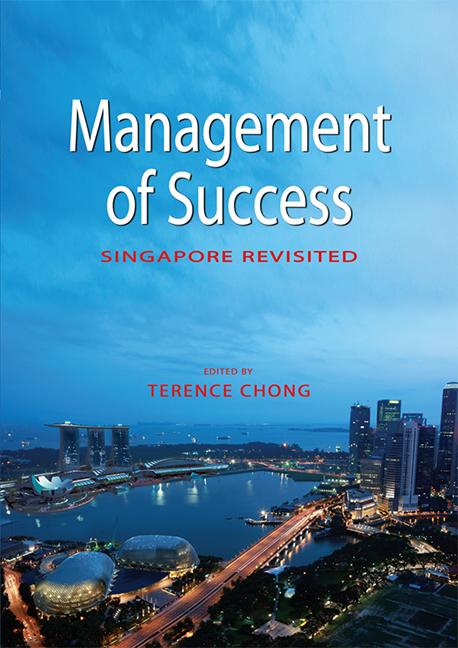Book contents
- Frontmatter
- Contents
- List of Tables and Figures
- Foreword
- Message
- Quote
- Preface
- The Contributors
- 1 Introduction: The Role of Success in Singapore's National Identity
- SECTION 1 SINGAPORE IN THE BIGGER PICTURE
- SECTION 2 LEADERSHIP, POLICY AND POLITICS
- SECTION 3 THE RESTRUCTURING OF THE ECONOMY
- 8 Singapore's Changing Economic Model
- 9 Globalizing State, Disappearing Nation: The Impact of Foreign Participation in the Singapore Economy
- 10 Exploring New Engines for Growth
- SECTION 4 THE TRANSFORMATION OF SOCIETY
- SECTION 5 THE LAW
- SECTION 6 MODIFICATION OF THE ENVIRONMENT
- SECTION 7 COMMUNITY AND NATIONAL SECURITY
- SECTION 8 LIFE IN SINGAPORE
- Index
10 - Exploring New Engines for Growth
from SECTION 3 - THE RESTRUCTURING OF THE ECONOMY
Published online by Cambridge University Press: 21 October 2015
- Frontmatter
- Contents
- List of Tables and Figures
- Foreword
- Message
- Quote
- Preface
- The Contributors
- 1 Introduction: The Role of Success in Singapore's National Identity
- SECTION 1 SINGAPORE IN THE BIGGER PICTURE
- SECTION 2 LEADERSHIP, POLICY AND POLITICS
- SECTION 3 THE RESTRUCTURING OF THE ECONOMY
- 8 Singapore's Changing Economic Model
- 9 Globalizing State, Disappearing Nation: The Impact of Foreign Participation in the Singapore Economy
- 10 Exploring New Engines for Growth
- SECTION 4 THE TRANSFORMATION OF SOCIETY
- SECTION 5 THE LAW
- SECTION 6 MODIFICATION OF THE ENVIRONMENT
- SECTION 7 COMMUNITY AND NATIONAL SECURITY
- SECTION 8 LIFE IN SINGAPORE
- Index
Summary
SINGAPORE INC AND THE CHALLENGES FOR GLOBALIZATION
Resource-scarce Singapore is in a resource-abundant neighbourhood which attracted colonial powers and migrants. From independence in 1965 the People's Action Party (PAP) government has been able to assess realistically Singapore's strengths and weaknesses, and to seize opportunities and minimize threats pragmatically. The entrepreneurial PAP operates on a government-must-know-best philosophy, (not merely government-knows-best) to ensure Singapore's small size and exposure to trade and foreign direct investment (FDI) are turned into strengths. Its economic development model, sometimes known as “Singapore Inc”, comprises Temasek Holdings Limited, Government of Singapore Investment Corporation (GIC) and many government-linked corporations (GLCs). Working with FDI and multinational corporations (MNCs), Singapore Inc restructured entrepôt trade into a manufacturing economy, and then to a knowledge-based economy (KBE), emphasizing intellectual capital in creative innovative industries. Nimble responses match ever-changing competitive advantage with emerging economies, globalization and information communication technology (ICT) propelling deregulation.
The PAP government is unapologetic about the interventionist Singapore Inc model, given the small domestic market and a commercially inclined private sector to turn into export-oriented industrialists. Its relentless search for new growth industries is not an industrial policy based on “picking winners”, but is market-based via world-class MNCs and FDI responding to policy incentives to locate in Singapore. As it is a free port, its trade policy works with many free trade agreements (FTAs) designed for market access and taps global talents to complement its efficient infrastructure and political stability. This chapter amplifies the reasons for an active government industrial strategy. It identifies and describes new growth industries and analyses their potential success to the extent possible. This chapter concludes that the economic sustainability of a small, open, and government-made city-state depends on the crucial balance of the good, bad, and ugly of globalization. This balance is crucial because high-technology, information communications technology (ICT), and human resources development (HRD) create jobs, income and social security with associated risks which domestic policies alone cannot address.
WHY SEARCH FOR NEW GROWTH INDUSTRIES?
The ever-changing domestic and external environments make continuous industrial restructuring necessary. The small city-state's population and ageing demographics are challenged by external competition with changing competitive advantage.
- Type
- Chapter
- Information
- Management of SuccessSingapore Revisited, pp. 159 - 180Publisher: ISEAS–Yusof Ishak InstitutePrint publication year: 2010



